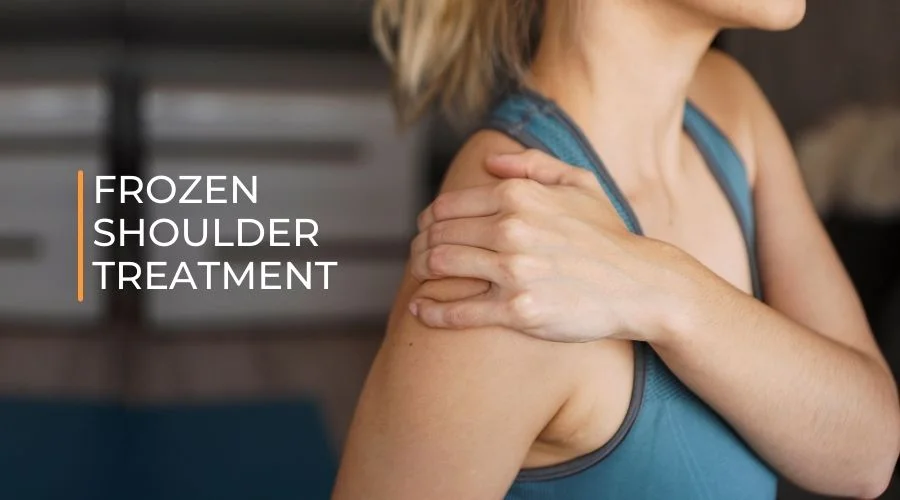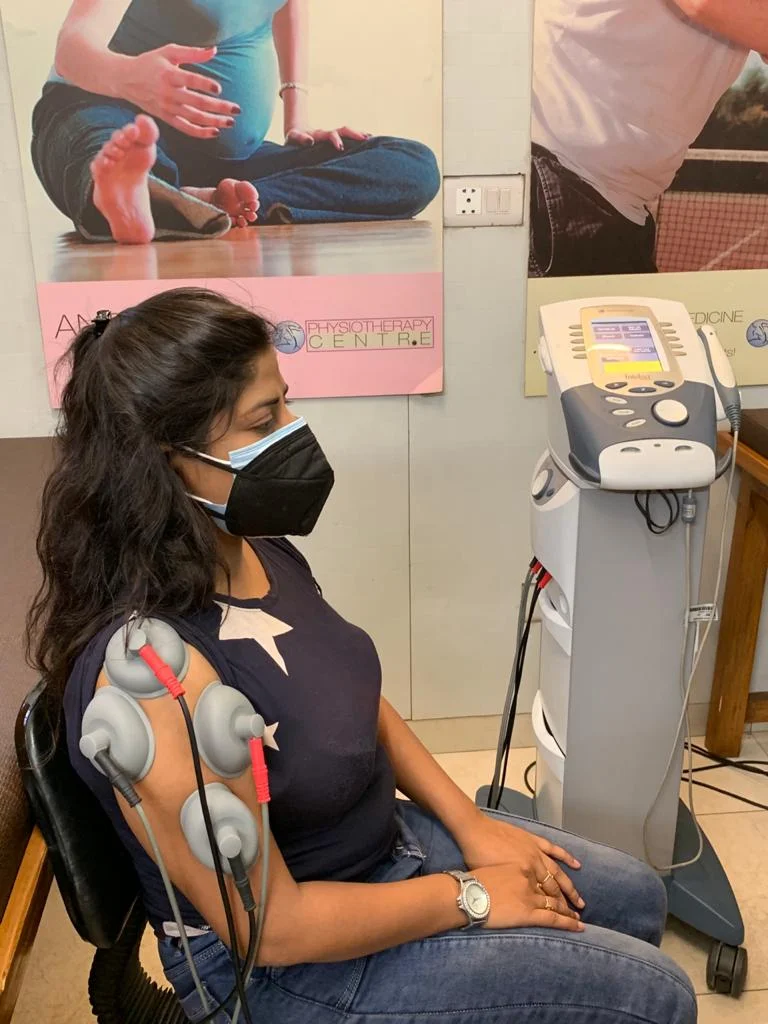Frozen Shoulder
Home / Frozen ShoulderFrozen Shoulder Treatment in Delhi

Delhi Physio Care provides expert consultation and treatment for frozen shoulder. We have an expert team headed by Dr. Shruti Paul who has over 20 years of experience in physiotherapy treatment.
The frozen shoulder should not be neglected and if you will ignore it continuously, it can worsen the pain. Patients with frozen shoulder experience pain and stiffness of the shoulder joint; inability to lift the arm, comb their hair, and simple daily routines like wearing clothes could get painful. The pain usually worsens at night.
It can be divided into-Idiopathic (without any known reason eg. some injury to the joint) frozen shoulder is often associated with other diseases like diabetes mellitus, thyroid diseases, and Parkinson’s Secondary adhesive capsulitis can occur due to a shoulder injury or immobilization of the joint (eg. Rotator cuff injuries, Bicipital tendinitis, etc.)
At Delhi Physio Care, we provide physiotherapy for a frozen shoulder that involves using the modalities and mobilization techniques including the shoulder glides, to decrease the pain and increase the range of motion. We have the latest machines that aid you to recover from frozen shoulder quickly.
Our team of expert physiotherapists would work on all the mouths of the joint. Depending on the individual’s condition, this could be done passively or active or active-assisted.
Our physiotherapy sessions for Frozen shoulder covers all the shoulder movements; flexion, abduction, internal rotation, external rotation, and extension of the joint.
As we start improving your shoulder pain and the range of movement, we start working on the shoulder strength. Specific resisted exercises are done to improve the strength of the joint. Therabands are also recommended for the same.
Seek an expert consultation today for frozen shoulder treatment. Contact us at – +91 98187 58101/9803 029 029 or fill in your details here and our team will contact you.
Frozen Shoulder Prevention & Treatment
Symptoms

Frozen shoulder typically develops slowly, and in three stages. Each of these stages can last a number of months.
- Painful stage. During this stage, pain occurs with any movement of your shoulder, and your shoulder’s range of motion starts to become limited.
- Frozen stage. Pain may begin to diminish during this stage. However, your shoulder becomes stiffer, and your range of motion decreases notably.
- Thawing stage. During the thawing stage, the range of motion in your shoulder begins to improve.
For some people, the pain worsens at night, sometimes disrupting normal sleep patterns.
Causes
The bones, ligaments and tendons that make up your shoulder joint are encased in a capsule of connective tissue. Frozen shoulder occurs when this capsule thickens and tightens around the shoulder joint, restricting its movement.
Doctors aren’t sure why this happens to some people and not to others, although it’s more likely to occur in people who have recently experienced prolonged immobilization of their shoulder, such as after surgery or an arm fracture.
Risk Factors
Although the exact cause is unknown, certain factors may increase your risk of developing frozen shoulder.
Age and sex
People 40 and older are more likely to experience frozen shoulder. Most of the people who develop the condition are women.
Immobility or reduced mobility
People who have experienced prolonged immobility or reduced mobility of their shoulder are at higher risk of developing frozen shoulder. Immobility may be the result of many factors, including:
- Rotator cuff injury
- Broken arm
- Stroke
- Recovery from surgery
Systemic diseases
People who have certain medical problems appear to be predisposed to develop frozen shoulder. Examples include:
- Diabetes
- Overactive thyroid (hyperthyroidism)
- Underactive thyroid (hypothyroidism)
- Cardiovascular disease
- Tuberculosis
- Parkinson’s disease
Prevention
One of the most common causes of frozen shoulder is the immobility that may result during recovery from a shoulder injury, broken arm or a stroke. If you’ve had an injury that makes it difficult to move your shoulder, talk to your doctor about what exercises would be best to maintain the range of motion in your shoulder joint.
Physiotherapy For Frozen Shoulder
Frozen shoulder or adhesive capsulitis presents itself as stiff and painful shoulder joint with restricted range of movement.
It takes a long time to heal, hence this painful condition can be very frustrating and debilitating.
Physiotherapy is the choice of treatment, that treats frozen shoulder effectively and fastens the recovery process. Even though the frozen shoulder is said to be self limiting, it presents itself with so much pain and stiffness that it is advisable to take physiotherapy. The exercises reduce the symptoms. Frozen shoulder if left untreated will persist, hence prolonging the misery.
The shoulder joint will have all the movements restricted, that includes flexion, abduction, adduction, internal and external rotation, and extension. External rotation is the most effected. The daily activities like wearing clothes, combing hair, lifting things start getting affected. Sleep gets interrupted. Night pain is positive. It is advisable not to sleep on the affected side. Frozen shoulder mostly starts with localized pain on the shoulder joint. If not treated pain gets referred to the arm and even the neck and trapezius region.
The acute phase of frozen shoulder which is also called the freezing phase presents with severe pain and stiff joint. The main focus is on pain relief. It is advised to avoid activities that increase pain. Exercises done are mild with gentle glides. Focus is on assisted exercises. Some exercises done in this stage are; isometrics, pendulum, gentle pulley movement. It is recommended to relax the joint before mobilizing by using hot or cold packs. The same is planned after exercises also. Other modalities like ultrasound, interferential therapy, laser work well for the referred pains.
Once the acute stage is getting better the focus is more on improving the range of movement in the shoulder. There is a significant beneficial effect seen with joint mobilization exercises. All the movements are worked at this stage; overhead flexion, rotations, extension. Home exercise programme is started. Heat packs can be taken four hourly for 15 to 20 minutes. The main focus at this point is to work on joint movement.
It is important to know that the shoulder pain is because of a stiff joint with limited range of movement. Once the joint starts opening up or as the range improves the pain starts getting better.
A combination of hot packs with stretches and joint glides work wonders.
Home programme exercises will include the pendulum exercises, towel stretch, finger walk on the wall, cross body reach and stretching horizontally on the table or the armpit stretch.
In the last phase of recovery or the thawing phase when the pain is better and the joint movement is getting better, start working on the strengthening. We start using weights . it is advisable to start by using the body weight first. Therabands are also introduced.
Remember, even though some conditions are self limiting but a treatment plan fastens the recovery hence reducing the misery time. Physiotherapy gives great results in adhesive capsulitis by not only helping in pain relief and movement but also by cutting down drastically the amount of painkillers the patient has to take.
Meet your physiotherapist today if you have frozen shoulder!!
QUICK ENQUIRY
Send us a message with your contact details and one of our staff will contact you right away.
TREATMENTS
BOOK AN APPOINTMENT
GENERAL ENQUIRIES
235, Avtar Enclave,Paschim Vihar,Delhi – 110063
Frozen Shoulder Physiotherapy Treatment
Frozen shoulder or Adhesive capsulitis (the medical term) is a physical condition in which a patient experiences pain and stiffness in the shoulder.
Frozen shoulder can be due to any injury involving your shoulder or a chronic disease that restricts your shoulder movement for a long duration.
There is no conclusive evidence that provides frozen shoulder is related to arthritis. However, some patients with arthritis do experience frozen shoulder due to restricted movements of their shoulder.
Our frozen shoulder treatment begins with a detailed consultation and study of your medical history. After evaluating your reports and comprehensive examination, we devise a customized rehabilitation plan that involves a range of motion exercises to treat your shoulder and make it normal.
Yes, most people after frozen shoulder treatment get their normal movement back.
Make sure your shoulder is always moving and avoid immobilization of your shoulder for long durations. If you experience any pain in the shoulder or during motion, consult a doctor immediately.
Studies have shown frozen shoulder occurs more in old age people having injuries or conditions like arm fracture, shoulder injury, stroke, diabetes, Parkinson’s disease etc.
